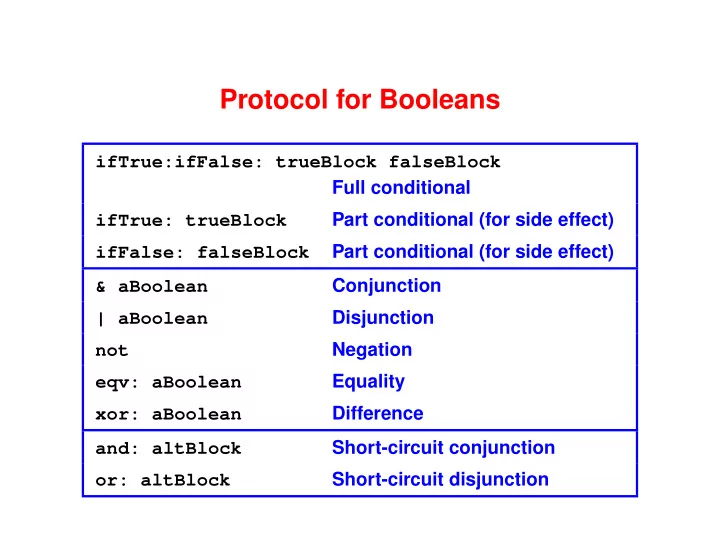

Protocol for Booleans ifTrue:ifFalse: trueBlock falseBlock Full conditional Part conditional (for side effect) ifTrue: trueBlock Part conditional (for side effect) ifFalse: falseBlock Conjunction & aBoolean Disjunction | aBoolean Negation not Equality eqv: aBoolean Difference xor: aBoolean Short-circuit conjunction and: altBlock Short-circuit disjunction or: altBlock
Classes True and False (class True Boolean [] (method ifTrue:ifFalse: (trueBlock falseBlock) (value trueBlock)) ) (class False Boolean [] (method ifTrue:ifFalse: (trueBlock falseBlock) (value falseBlock)) ) What happens if ifTrue: is sent to true ?
ifTrue: message dispatched to class Boolean (class Boolean Object [] (method ifTrue:ifFalse: (trueBlock falseBlock) (subclassResponsibility self)) (method ifTrue: (trueBlock) (ifTrue:ifFalse: self trueBlock {})) ... ) Message sent to self starts over (with class of receiver)
Dispatching to True (class True Boolean [] (method ifTrue:ifFalse: (trueBlock falseBlock) (value trueBlock)) ; all other methods are inherited )
Your turn: not What should not look like? • Implemented on what class? • With what method definition?
Implementing not (class Boolean Object [] (method ifTrue:ifFalse: (trueBlock falseBlock) (subclassResponsibility self)) (method ifTrue: (trueBlock) (ifTrue:ifFalse: self trueBlock {})) (method not () (ifTrue:ifFalse: self {false} {true})) ... )
Inheritance for Booleans Boolean True False Boolean is abstract class • Instances of True and False only Method ifTrue:ifFalse: defined on True and False All others defined on Boolean
Each class has one of two roles Abstract class • Meant to be inherited from • Some ( > 0 ) subclassResponsibility methods • Examples: Boolean, Shape, Collection Regular (“concrete”) class • Meant to be instantiated • No subclassResponsibility methods • Examples: True, Triangle, List
Syntax comparison: Impcore to Smalltalk Exp = LITERAL of rep | VAR of name | SET of name * exp | IF of exp * exp * exp | WHILE of exp * exp | BEGIN of exp list | APPLY of name * exp list | SEND of name * exp * exp list | BLOCK of name list * exp list
“Number hierarchy” Object Magnitude Number Integer Fraction Float
“Extended Number hierarchy” Object Magnitude Natural Number Integer Fraction Float LargeInteger SmallInteger LargePositiveInteger LargeNegativeInteger
Instance protocol for Magnitude equality (like Magnitudes) = aMagnitude comparison (ditto) < aMagnitude comparison (ditto) > aMagnitude comparison (ditto) <= aMagnitude comparison (ditto) >= aMagnitude minimum (ditto) min: aMagnitude maximum (ditto) max: aMagnitude Subclasses: Date , Natural • Compare Date with Date , Natural w/ Natural , . . .
Your turn: object-oriented design equality = aMagnitude comparison < aMagnitude comparison > aMagnitude comparison <= aMagnitude comparison >= aMagnitude minimum min: aMagnitude maximum max: aMagnitude Questions: • Which methods “subclass responsibility”? • Which methods on Magnitude ?
Implementation of Magnitude (class Magnitude Object [] ; abstract class (method = (x) (subclassResponsibility self)) ; may not inherit = from Object (method < (x) (subclassResponsibility self)) (method > (y) (< y self)) (method <= (x) (not (> self x))) (method >= (x) (not (< self x))) (method min: (aMagnitude) (if (< self aMagnitude) {self} {aMagnitude})) (method max: (aMagnitude) (if (> self aMagnitude) {self} {aMagnitude})) )
Instance protocol for Number negated reciprocal absolute value abs addition + aNumber subtraction - aNumber multiplication * aNumber division (converted!) / aNumber sign check negative sign check nonnegative sign check strictlyPositive
More instance protocol for Number class of receiver, value of coerce: aNumber argument conversion asInteger conversion asFraction conversion asFloat
Your turn: Object-oriented design Given Magnitude , minimal set of these methods: negated coerce: * reciprocal / asInteger abs negative asFraction + nonnegative asFloat - strictlyPositive
Number methods (method - (y) (+ self (negated y))) (method abs () (ifTrue:IfFalse (negative self) {(negated self)} {self})) (method / (y) (* self (reciprocal y))) (method negative () (< self (coerce: self 0))) (method nonnegative () (>= self (coerce: self 0))) (method strictlyPositive () (> self (coerce: self 0)))
“Collection hierarchy” Collection KeyedCollection Set Dictionary SequenceableCollection Array List
Collection mutators add: newObject Add argument addAll: aCollection Add every element of arg remove: oldObject Remove arg, error if absent remove:ifAbsent: oldObject exnBlock Remove the argument, evaluate exnBlock if absent removeAll: aCollection Remove every element of arg
Collection observers Is it empty? isEmpty How many elements? size includes: anObject Does receiver contain arg? occurrencesOf: anObject How many times? detect: aBlock Find and answer element satisfying aBlock (cf � Scheme exists? ) detect:ifNone: aBlock exnBlock Detect, recover if none Set of receiver’s elements asSet
Collection iterators do: aBlock For each element x , evaluate (value aBlock x) . inject:into: thisValue binaryBlock Essentially � Scheme foldl select: aBlock Essentially � Scheme filter reject: aBlock Filter for not satisfying aBlock collect: aBlock Essentially � Scheme map
Implementing collections (class Collection Object [] ; abstract (method do: (aBlock) (subclassResponsibility self)) (method add: (newObject) (subclassResponsibility self)) (method remove:ifAbsent (oldObj exnBlock) (subclassResponsibility self)) (method species () (subclassResponsibility self)) h other methods of class Collection i )
Reusable methods h other methods of class Collection i = (method addAll: (aCollection) (do: aCollection [block(x) (add: self x)]) aCollection) (method size () [locals temp] (set temp 0) (do: self [block(_) (set temp (+ temp 1))]) temp) These methods always work Subclasses can override (redefine) with more efficient versions
species method Create “collection like the reciever” Example: filtering h other methods of class Collection i = (method select: (aBlock) [locals temp] (set temp (new (species self))) (do: self [block (x) (ifTrue: (value aBlock x) {(add: temp x)})]) temp)
Recommend
More recommend